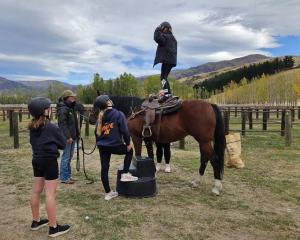For the past five years, the Central Otago District Council has been able to fine the owners of dogs who foul in public places, but has never done so.
Under the dog control bylaw introduced in 2006, the council can fine dog owners $300 for permitting their dogs to foul in a public place.
The annual report on dog control in the district was discussed at this week's council meeting and sparked a discussion on dogs' toilet habits.
"That would be the most common complaint I hear from people, about dogs fouling," Cr Clair Higginson said.
Council planning and environment manager Louise van der Voort, said the dogs would have to be seen "in the act" before an infringement notice could be issued to owners.
Cr Martin McPherson asked whether people complaining about dogs fouling could provide photographic evidence.
"If they can provide some evidence, that would be good. If we issue an infringement notice, and people don't pay the fine, the next stage is to take them to court," Ms van der Voort said.
Cr McPherson had an equally effective solution to the problem: "I find yelling to the dog owner from my balcony at home: 'Oi, pick that up', works really well."
A total of 6064 dogs in the district are registered, with more than half classified as working dogs.
The council received 281 complaints last year about dogs, with the majority about wandering dogs and the rest about barking or aggressive dogs.
Eight registered dogs are classified as dangerous, which means they must be muzzled in public, must be neutered or spayed and must be kept in a fenced area which is separate to the owner's house access.
Ms van der Voort said the council was taking a "harder line" on dangerous and menacing dogs as the public did not tolerate aggressive dog behaviour. Any animal that was deemed to pose a threat to the safety of any person, stock or protected wildlife would receive such a classification.
Electoral system
Changing the electoral system would lead to more diverse representation on the Central Otago District Council, Cr Clair Higginson believes.
"Keeping the current system [first past the post] will perpetuate the sameness, " she said.
"People say to me: 'I'm not going to go in there [on the council] with those people.' There's no examples of colour and vibrancy."
Cr Higginson said the single transferable voting system, where electors rank candidates in order of preference, would be a better option and she moved the council should change to that system. The motion was lost and the council agreed to stay with the present system.
Maniototo roads
The impact of milk tankers on gravel roads in the Maniototo came under the spotlight at a meeting between representatives from Fonterra and the district council recently.
Maniototo Community Board chairman and district councillor Barry Becker told the council in February more intensive farming in the Maniototo was taking its toll on council roads.
Council roading manager Julie Muir said the meeting with Fonterra was beneficial.
Irrigation schemes
Funding for new irrigation schemes in the district should be considered on a case-by-case basis, the council decided.
It considered a report on the topic and decided it could not adopt a generic approach.
"When we get a request for assistance, we'll have to analyse it, based on that specific irrigation scheme, " Central Otago Mayor Tony Lepper said.












